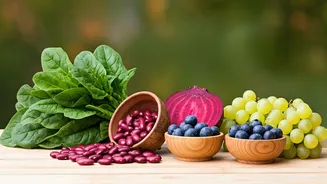Kidney Health Basics
Your kidneys are your body's silent heroes, working tirelessly to filter waste and excess fluids. They're essential for maintaining a healthy balance within
your body, and proper function is critical for overall well-being. When the kidneys struggle, it can lead to a buildup of toxins, potentially causing serious health complications. Therefore, supporting their function through diet and lifestyle choices is vital. Certain foods are particularly beneficial in promoting kidney health. Incorporating these into your daily meals can provide vital nutrients and help the kidneys do their job more efficiently. Eating a balanced diet with kidney-friendly foods can lower the risk of developing kidney-related problems down the road. Protecting your kidneys should be a priority, and understanding the role of food in supporting them is a great first step.
The Power of Cranberries
Cranberries are more than just a festive treat; they are packed with compounds that can significantly benefit your kidneys. Known for their ability to help prevent urinary tract infections (UTIs), cranberries work by preventing bacteria from attaching to the walls of the urinary tract. This can indirectly support kidney health by reducing the risk of infections that could potentially impact kidney function. Consuming cranberries in moderation, such as through cranberry juice or dried cranberries, can be part of a strategy for maintaining kidney health. However, it’s important to note that some cranberry products contain added sugars, so opting for unsweetened versions is best to minimize sugar intake. Cranberries are a natural and delicious way to boost your defenses against UTIs and maintain a healthy urinary system.
Embrace the Beetroot
Beetroot, with its vibrant color and earthy flavor, is another kidney-friendly food you can incorporate into your diet. These root vegetables are rich in antioxidants and nutrients that can help support kidney function. Beetroot contains betaine, which aids the liver in detoxification, indirectly easing the workload on the kidneys. They are also a source of nitrates, which help improve blood flow. Better circulation helps all organs function efficiently, including the kidneys. You can enjoy beets in various ways, from roasted beets in salads to beetroot juice. However, people prone to kidney stones should be mindful of oxalate content in beets. Moderation is always key, and consulting a healthcare professional is advisable if you have specific health concerns. Beetroot makes for a tasty, healthy choice.
The Wonders of Watermelon
Watermelon is not just a refreshing summer treat; it is also an excellent food to promote kidney health. This juicy fruit is primarily water, which is essential for keeping your kidneys hydrated and flushing out waste products. Staying well-hydrated is one of the most crucial things you can do for kidney health. Watermelon contains citrulline, an amino acid that helps to remove ammonia from the body, easing the strain on the kidneys. It's low in potassium, making it a safe choice for individuals with certain kidney conditions who must watch their potassium intake. In addition to its hydrating properties, watermelon is also rich in antioxidants. This can protect your kidneys from damage caused by free radicals. Enjoying watermelon during the warmer months is a delicious way to support your kidneys and overall health.
The Greatness of Grapes
Grapes, whether green, red, or black, are a nutritious addition to a kidney-friendly diet. Grapes are known for their antioxidant and anti-inflammatory properties. They contain flavonoids, which help protect against cellular damage, and resveratrol, which may protect against chronic diseases. These properties can contribute to the overall well-being of your kidneys by reducing inflammation. Grapes are also a good source of potassium, so individuals with kidney problems must consume them in moderation. You can add grapes to your breakfast, have them as a snack, or even incorporate them into your salads for a nutritional boost. Including grapes as part of a balanced diet can play a role in supporting long-term kidney health.
Cabbage's Kidney Benefits
Cabbage is a versatile and affordable vegetable that can be highly beneficial for kidney health. It is low in potassium, making it a suitable choice for individuals who must monitor their potassium intake due to kidney issues. Cabbage is packed with vitamins, minerals, and antioxidants that support kidney function. It's also high in fiber, which can help with digestion and keep your body functioning well. Cabbage can be enjoyed in various forms, such as raw in salads, steamed, sautéed, or even fermented (as sauerkraut or kimchi). Adding cabbage to your diet is an easy and nutritious way to promote kidney health. It can reduce the load on your kidneys by promoting overall body wellness.














